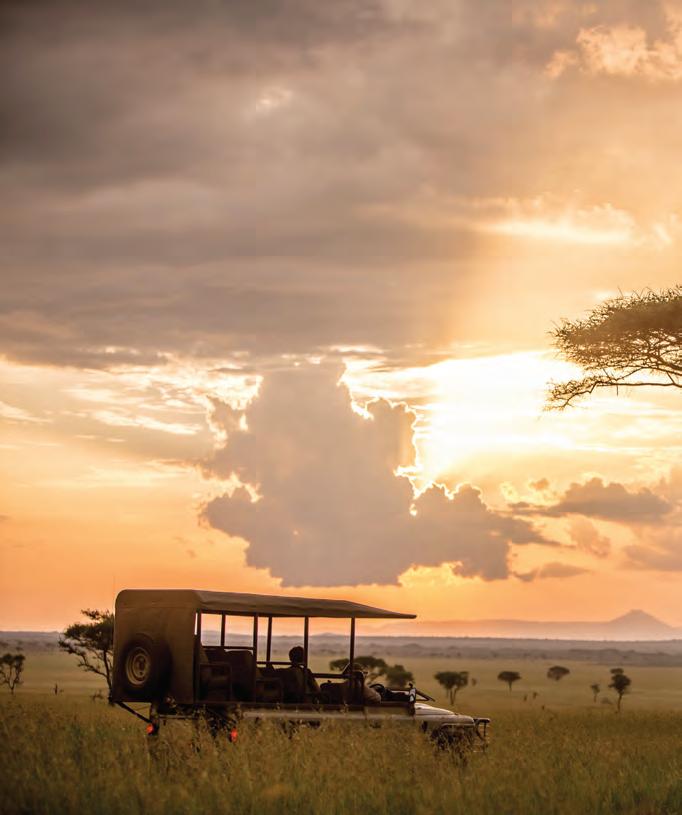
3 minute read
Man with a 100-year VISION
from The Crest 94
LUKE BAILES’ LONG-TERM GOAL IS TO PRESERVE AFRICA’S WILDERNESS AREAS FOR FUTURE GENERATIONS, WRITES ROBIN LAMPLOUGH
Luke Bailes is the founder and executive chairman of Singita, a conservation and ecotourism brand which protects almost a million acres of land in southern Africa. In the last 26 years, Singita has won numerous, prestigious World’s Best Hotel awards. But Luke’s roots are firmly in the Upper Highway. His father built a magnificent house at Camp Orchards. From his grandfather, James Fawcett Bailes, Luke inherited a great deal of land in different parts of South Africa. Braby’s Highway Directory for 2006-7 labelled a stretch of property along Inanda Road from Green Meadow Lane to the edge of Waterfall as “Luke Bailes Farm”. Most importantly, however, was 12 000 acres of bushveld in Sabi Sand. It was here that the first Singita lodge, Singita Ebony, was opened in 1993.
Advertisement
Educated at Kearsney College, Luke went on to take an interest in polo. On Camp Orchards at the edge of Hillcrest, he constructed a field that attracted many local players. He still owns Fig Trees Farm and was involved in the development of Cotswold Downs. A local security firm is said to be part of his local portfolio. Many of his trusted employees today are men whose qualities he identified during these formative years.
In 2020 the focus of Luke’s attention is an organisation known as Singita, which is a XiTsonga (we used to call it Shangaan) word meaning “place of miracles”. Singita exists, according to Luke, to provide a genuine African experience for international visitors. In the process, however, it helps to preserve wild areas, to develop saleable skills in the local population, and through its marketing promote the long-term sustainability of a concept designed to make an important contribution to rural Africa. Luke speaks of making decisions which take into account “twenty, fifty, even a hundred-year horizons.”


ABOVE: Luke Bailes – the founder of Singita, a conservation and ecotourism brand which protects almost a million acres of land in southern Africa.

The story began in 1925, when Luke’s grandfather bought some 12 000 acres of land on the western edge of the Kruger National Park. Used at first as a hunting concession, the area was later developed into the Sabi Sand Game Reserve. Luke has spoken of a visit there at the age of eight, when, from a tree house, he watched a pride of lions on the veld – an experience that had a profound impact on his later thinking.
Luke came into his inheritance at a time when international demand for the safari experience had led to a proliferation of lodges. Most of these did more harm than good to the environment which was so ruthlessly being exploited. He developed a model for high-value low-impact ecotourism. Singita offers luxury safaris to a small group of guests who are willing and able to pay for the life-changing experience, while minimising the impact on pristine land.
Singita began in Sabi Sand, with the objective of restoring the land to its original condition and opening it up to sustainable ecotourism. Today Luke’s long-term goal is to preserve Africa’s wilderness areas for future generations. He speaks of seeking to reach his guests on every level: spiritual, emotional and physical. And, in the process, he has created employment, training and career opportunities for a significant number of people living near the lodges in each region. In a recent interview, Luke made reference to the accommodation Singita offers. Apart from the original lodge in Sabi Sand, Singita now has lodges and camps in Tanzania, Zimbabwe and, most recently, in the Volcanoes National Park in Rwanda.
Luke’s insights into the opportunities offered by Africa’s surviving wild places, coupled with his acute perception of rural Africa’s desperate needs, seem to be making a massive contribution to the preservation of several iconic wilderness areas in Africa.







